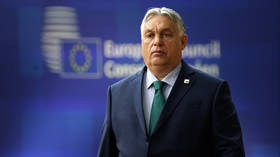Brexit draft agreement: Kicking Northern Ireland border issue down the road & other key points
The draft Brexit agreement has prompted several resignations in Theresa May's government and many negative assessments across the UK. European Union officials, however, seem content with it. Here are the key points of the deal.
While being as vague as possible, the 585-page draft sheds some light on the EU-UK relations after their divorce. The draft document, published late on Wednesday, envisions the post-Brexit transition period set to last until the end of 2020. The UK and the European Union are set to have a joint "customs area" until the end of the transition – when the future relationship is supposed to be fully formed.
Irish border remains the main obstacle
Northern Ireland seems to get the most out of it – the region is set to abide by the UK customs rules, yet still follow regulations of the union. The draft document effectively treats Northern Ireland as a separate entity from the rest of the UK, since local goods are set to bear special markings.
.@UKLabour claims @Conservatives government is at risk of completely dissolving https://t.co/UnqZRAYbnE
— RT UK (@RTUKnews) November 15, 2018
When the transition period ends, then the UK has the following options – to extend the period, staying in the customs union with the EU (which is the same as before Brexit, but without actual say on the policies), while accepting that Northern Ireland follows internal EU rules. The EU legislation will apply to industrial, agricultural and environmental goods, yet it will be policed by British officials.
READ MORE: 'Time to write?' - Rees-Mogg to submit letter of no-confidence in May as Tory leader
Another option is to somehow find a solution to keep the Irish border open, as the document reaffirms the EU's and the UK's "intention" to replace the "backstop" solution "by a subsequent agreement that establishes alternative arrangements for ensuring the absence of a hard border on the island of Ireland on a permanent footing."
The draft agreement contains a review provision for the backstop, which can be triggered unilaterally by the UK, yet has to be discussed by a joint commission with the EU.
Theresa May's EU withdrawal agreement leaves the UK in a "halfway house with no time limit on when we will finally become a sovereign nation," said Northern Ireland Minister Shailesh Vara in his letter of resignation. Scottish politicians were also unhappy with Northern Ireland getting preferential treatment.
Movement of people
While the UK will leave the EU on March 29, 2019 while still remaining inside the bloc's single market as a "single customs territory" until the end of the transition period, some three million EU citizens in the UK, and over one million UK nationals in the remaining 27 EU countries, will continue to enjoy the rights to live and work as they have now.
No democratic nation has ever signed up to be bound by such an extensive regime - Dominic Raab#Brexithttps://t.co/YSNfB5WwzXpic.twitter.com/KZQdjnRttD
— RT (@RT_com) November 15, 2018
The condition to "enjoy equal treatment with the nationals of that state" is applicable to EU and UK citizens and their family members that have lived abroad within the block for the last five years. Those persons will also maintain their rights to social security benefits including healthcare and pensions.
Fishing
The UK will remain bound by Common Fisheries Policy until the end of the transition period, after which London will seek to become "an independent coastal state." Britain, however, will still be "consulted" on "fishing opportunities" and will take part in the decision-making process of the bloc. This term may potentially cause more troubles if the sides do not come to an agreement on tariffs on UK fish sold in EU.
Equality
Brexiters were hoping to get away from strict EU labor laws and have a low-tax economy like in Singapore, so the UK's "level playing field" commitment in the agreement that makes it follow the Union's rules on competition, state aid, employment standards and tax is unlikely to please them.
Paying for Brexit
The agreement calls for London to settle its financial obligations with the EU, which is currently estimated to be £39 billion (€44 billion).
Environment
The UK will remain committed to the bloc's environmental standards after leaving the EU and will honor international agreements, including the Paris Agreement on climate change.
Gibraltar
Gibraltar is a British Overseas Territory and by default, will also exit the EU next year. As part of the Brexit agreement, London consented to cooperate with Madrid on citizens' rights, environment, police and customs matters when it comes to the disputed territory.
Think your friends would be interested? Share this story!













